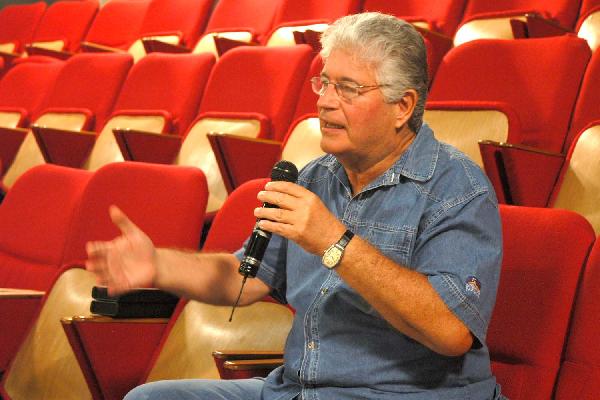
requiaodebatecomlessanartve.jpg, image/jpeg, 1500x1000
He criticized the conduction of economic policy by Brazilian Central Bank. "The CB is throwing money in the market without taking a specific concern with the change in the economic model, with public investment." Our concern is to analyze the crisis from the perspective of individuals, of the nation, and not

requiaodebatecomlessanartve.jpg, image/jpeg, 1500x1000
Brazilian Paraná States’ governor Roberto Requião announced, Sunday (9) night in the auditorium of RTVE (Paraná State’s Public TV), that the State Government will sponsor a world seminar at Curitiba, to discuss the economic crisis.
Requião participated in Brazilian Nation RTVE’s tv program. The suggestion for the seminar was made by economist Carlos Lessa, former rector of the Federal University of Rio de Janeiro and former president of BNDES (National Bank to Economic and Social Development), and Darc Costa, former vice president of BNDES, which also participated in the program.
The governor said this Tuesday (11) that the international seminar must happen in December and that the state will discuss crisis in financial system. "The idea is to bring the best brains in the world to a discussion showing a way to get out of the crisis," he said at the opening of the weekly meeting of the School of Government.
The government of Parana, Copel (Parana State’s Eletric Power Company), Sanepar (Parana State’s Water and Sanitation Company) and Parana Welfare Office
will sponsor and organize the event.
"What the advocates of neo liberalism do want is simply to solve the problem of financial capital. In Brazil, we see a very clear privilege to exporters, to commodities, which have been internationalized to international trade companies, "said the governor.
He criticized the conduction of economic policy by Brazilian Central Bank. "The CB is throwing money in the market without taking a specific concern with the change in the economic model, with public investment." Our concern is to analyze the crisis from the perspective of individuals, of the nation, and not from the perspective of the market, because the market heralds want to resolve now what themselves caused, with their bad conduction of economic policy, "explained the governor. "We want a concrete and feasible suggestion for a permanent change, as the god market proved to be totally ineffective, creating a crisis of enormous proportions", argued the governor.
"The idea of the seminar arose because we see now the crisis being reviewed by the heralds of neo-liberalism, by people whose way of understanding the economy provoked the crisis. But they want to fill the remedies to the problem, they want a lampedusian, gattopardian solution, want to change everything so that everything stays exactly as it is, "criticized Requiao, quoting the Sicilian writer Giuseppe Tomasi di Lampedusa, author of the classic Il Gattopardo.
The governor thinks the lack of an alternative project has caused millions of Brazilians, deluded by the current economic model, put at risk their capital. "So brazilian people need a sign to a firm and consequent change. We can not accept minor changes so that everything is kept as it is," said Requião.
He cited that this is the third crisis experienced by capitalism. "This lie so-called a self-regulated market is diminished, is over. Let's go to a planning guide, such as that done by De Gaulle, after World-War II, at France, with the state showing the way, signaling with incentives, support and financing. But I can not imagine how this can be done by cutting oneself’s meat, as proposed by Minister of Planning, Paulo Bernardo, for whom did not commit any crime.
" The idea is to bring together the biggest names in the world economy, to discuss the crisis, forward proposals to mitigate their effects and find solutions through an alternative economic model. "We can not change the current economic model from day to night. But we have to begin to discuss an alternative model, which will grow at the expense of intelligence and contributions from the government as the model tied to the idea of globalization dies," argues Requiao.
According to him, Paraná State is already taking some measures that will certainly help companies and people to overcome the moment of turbulence. "Here, small and home enterprises do not pay taxes, little ones pay almost nothing. The poorest people have free electricity. We’re struggling against this absurdity that is road toll, the privatization of infrastructure, and we do provide water and sanitation virtually free to the poorest.
" TOOLS - Finally, Requiao sent to Legislative Assembly a bill, authored by Executive Power, which reduces from 18% to 12% the value of Tax on Circulation of Goods of 95 thousand daily consumer goods . "This reduction will focus on what we called the salary-consume goods, what the wages of middle class purchase. It's a way to contain the inflationary process. Furthermore, according to the Fiscal Responsibility Law, changing some tax rates on electric power, beverages, cigarettes and communication. Small changes that do not move the economy of the population. " Requião emphasized that Paraná has the cheapest electricity in Brazil, thanks to Copel. "We have talked about the rise in energy prices cause American dollar, which regulates the price of energy produced by Itaipu, had risen. Copel will hold that because it is taking profits of more than U.S. $ 1.4 billion a year. There’s no reason to the fare to increase, "he said.
He thinks shareholders need to have profit, but we need to think Copel under the government policy. "Copel will sustain this price with great advantage compared to when the government assumed the company that had an accounting loss of $ 364 million. In the first year of our government, the profit was U.S. $ 174 million, and from hence, a profit over $ 1.4 billion. So you can not think about readjustment ", finalized.
Original: International seminar to discuss how to exit the financial crisis announced